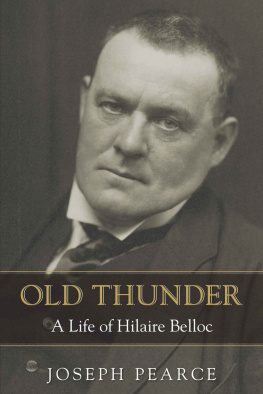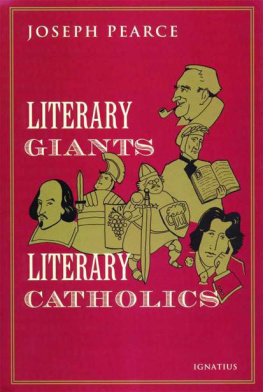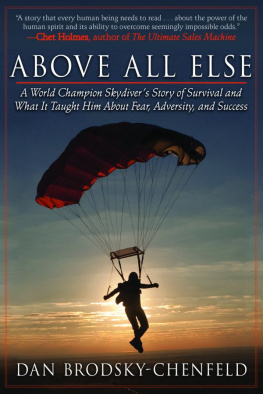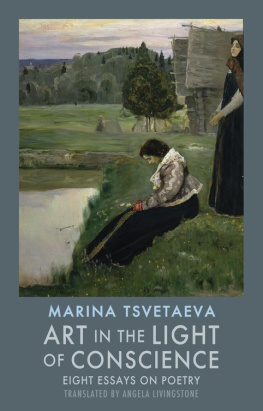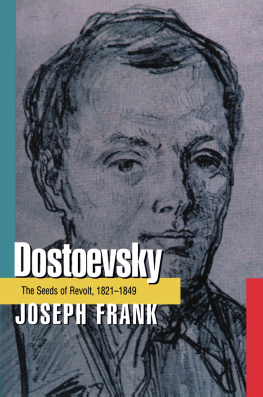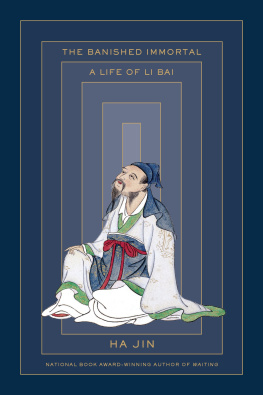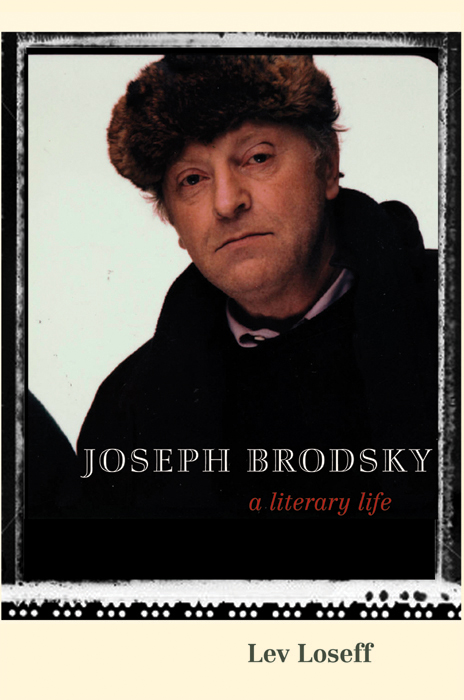JOSEPH BRODSKY
L E V L O S E F F
Translated by Jane Ann Miller
Joseph Brodsky
A L I T E R A R Y L I F E
Yale UNIVERSITY PRESS
NEW HAVEN & LONDON
Published with assistance from the foundation established in memory of Amasa Stone Mather of the Class of 1907, Yale College.
Copyright 2011 by Yale University.
All rights reserved.
This book may not be reproduced, in whole or in part, including illustrations, in any form (beyond that copying permitted by Sections 107 and 108 of the U.S. Copyright Law and except by reviewers for the public press), without written permission from the publishers.
Originally published as Lev Losev, Iosif Brodskii: Opyt literaturnoi biografii (Moscow: Molodaia gvardiia, 2006).
Quotations from the published and unpublished works of Joseph Brodsky are copyright by Joseph Brodsky and reproduced by permission of the Estate of Joseph Brodsky. Translations are those by or approved by Joseph Brodsky except as otherwise noted.
W. H. Auden: In Memory of W. B. Yeats, copyright 1940 and renewed 1968 by W. H. Auden, Shield of Achilles, copyright 1952 by W. H. Auden, from Collected Poems by W. H. Auden. Used by permission of Random House, Inc.
Set in FontShop Scala type by Duke & Company, Devon, Pennsylvania.
Printed in the United States of America by Sheridan Books, Ann Arbor, Michigan.
Library of Congress Cataloging-in-Publication Data
Losev, Lev, 19372009.
[Iosif Brodskii. English]
Joseph Brodsky: a literary life / Lev Loseff; translated by Jane Ann Miller.
p. cm.
Originally published: Moscow: Molodaia gvardiia, 2006, under title Iosif Brodskii:
Opyt literaturnoi biografii.
Includes bibliographical references and index.
ISBN 978-0-300-14119-1 (alk. paper)
1. Brodsky, Joseph, 19401996. 2. Authors, Russian20th centuryBiography.
I. Miller, Jane Ann. II. Title.
PG3479.4.R64Z76513 2011
891.7144dc22
2010024542
A catalogue record for this book is available from the British Library.
This paper meets the requirements of ANSI/NISO Z39.48-1992 (Permanence of Paper).
10 9 8 7 6 5 4 3 2 1
CONTENTS
.
.
.
.
.
.
.
.
.
.
PREFACE
There were a number of reasons for me not to write this book. Joseph Brodsky was a close friend of mine for more than thirty years, and I am fairly certain that he would not have been enthusiastic about anyone writing his life. Most likely, he would have shrugged and said, Well, if you feel like doing it, then switched the conversation to something he thought more interesting. But Brodskys attitude toward writers biographies was fraught with contradictions. He always insisted on the irrelevance of his life to his poetry, but he was an avid reader of other poets lives. For example, in his Nobel lecture he said: It is precisely their lives [Mandelstams, Akhmatovas, Tsvetaevas, Audens, and Frosts], no matter how tragic or bitter they were, that often moves memore often perhaps than the case should beto regret the passage of time. From the beginning I set out to write a literary biography, not a chronicle of Brodskys life. Being a good friend of ones subject is not necessarily an advantage: here one must strive for objectivity. But I cannot comment on Josephs life and work dispassionately, not only because I loved him but also because I thought him a genius.
Genius is not a scholarly term.
These voices from the past confirmed my own intuition: it is impossible for me or anyone I know to lay claim to a total understanding of Brodsky, the man and the poet. A critic may successfully comment on some aspects of his poetry and a writer may well describe some event in his life, but there will be always something equally important left outsomething inexplicable, indescribable, unfathomable. The lesser cannot comment upon the greater.
This last phrase Ive borrowed from Brodsky. Once, when invited to give a talk about the nature of artistic creativity, he started by expressing doubt that the phenomenon could be explained at all. To explain why artists create is as impossible as explaining why cats meow (hence the title of his essay A Cats Meow), and he added: The lesser commenting upon the greater has, of course, a certain humbling appeal, and at our end of the galaxy we are quite accustomed to this sort of procedure.
The time will come when someone will write a proper biography of Brodsky, wherein his life will be presented in much greater detail. The future biographer will undoubtedly make use of those of his personal papers that are currently closed to public scrutiny. Moreover, the future biographer will not be hindered by any obligation to protect the privacy of those who were intimately related to the poet at different periods in his life. This book is merely an attempt at re-creating the noise of time, as Mandelstam called itthat is, the heterogeneous cultural background of the poets life and work: the books he read cover to cover and the books he just skimmed; the words of people dear to him and the voices of the street; world events and personal troubles; travels, buildings, paintings, music, meals, wines, jobs, diagnoses, and so on and so forth. It does not aspire to be a biography of the poet, although it begins: Iosif Aleksandrovich Brodsky was born on May 24, 1940, in Leningrad
This book would not have been possible without the generous care of many individuals, especially Mikhail Gronas, Yakov Klots, and Irina Kaliteevskaya. Special gratitude is also owed to the Estate of Joseph Brodsky, and to Ann Kjellberg in particular.
NOTE ON TRANSLATIONS AND SOURCES
Joseph Brodskys poems that appear in his Collected Poems in English (New York: Farrar, Straus and Giroux, 2000) are quoted as they appear there, with the exception of Portrait of Tragedy. When the peculiarities of the original Russian text are being discussed, poems appear in non-poetic (interlinear) translation. The non-poetic translations are Jane Ann Millers, and those quotations are followed by references to the relevant collections of Brodskys poetry in Russian.
For quotations taken from Brodskys Collected Poems in English, no reference is provided. A list of abbreviations used in citing other sources appears at the beginning of the bibliography.
All quotations from Russian and other non-English texts are in Jane Ann Millers translations unless otherwise indicated.
Solomon Volkovs Dialogi s Iosifom Brodskim, 2nd ed., expanded (Moscow: Nezavisimaya gazeta, 2000), quoted here, was compiled without Brodskys participation. The Estate of Joseph Brodsky has requested access to the tapes upon which it was based, and these have not been provided or made public.
Almost all of Brodskys papers at Yales Beinecke Rare Book and Manuscript Library are open for public scrutiny. A portion of the papers housed at the National Library of Russia in Saint Petersburg are closed, at their authors request.
Every effort has been made to supply complete and correct credits; if there are errors or omissions, please contact Yale University Press so that corrections can be made in any subsequent edition.
The system of Russian transliteration is mostly that of the Library of Congress, with the following exceptions. Masculine family names ending in -skii are spelled with -sky to make them consistent with Brodskys name. The vowels ia, io, iu are here spelled ya, yo, yu; the short i (i-kratkoe) is spelled y; the soft sign is not marked.



